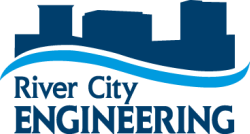What is building commissioning?
|
Let RCE introduce you to an exciting opportunity to ensure that your building project is successful. Commissioning includes a third party professional working to ensure system selection, operation, energy conservation, maintainability, and occupant comfort all achieve your goals. Today's buildings are extremely complex, and many have operational issues from day one. They are no longer a combination of independent systems but instead consist of multiple systems which are integrated and must work in concert. Commissioning is becoming a critical aspect of ensuring project success. Instead of waiting for occupant or maintenance personnel complaints to identify issues (often after the warranty period has passed), commissioning tests the systems as whole processes to rectify those hidden problems.
For more information please see these documents: |
|
How does Commissioning provide a cost benefit?
|
While commissioning agents understand the value that they bring to projects, it is often challenging to quantify that in dollars or operational value to the owner. The following report discussed this issue quite well:
|
New Construction Commissioning
|
New construction has the greatest opportunity for project improvement through commissioning. A commissioning agent works for the owner during design, to steer the design to a solution which best meets the owners goals. During construction the Commissioning Agent is another set of eyes confirming quality construction and adherance to the contract documents, and this is documented by the Commissioning agent creating prefunctional checklists which the contractor uses to check off critical issues associated with the construction and installation of equipment and systems. The most important part of Commissioning is Functional Performance Testing, where the systems are tested as a whole for performance under numerous operating conditions. While the contractor tests the various pieces of equipment installed, the commissioning agent tests that equipment together, to simulate operating conditions that are anticipated in the building. This way, Commissioning strives to identify operational issues even before the construction is complete. Lastly, commissioning includes creating a commissioning report, which serves as a document of "institutional knowledge" that paints a picture of the project to explain it to maintenance personnel over time. This is especially important to put the project into operational terms (vs construction) but also to include changes to the project that occurred during construction and may not be documented anywhere else.
|
Existing Building Commissioning
|
Existing Building Commissioning (also called Retro-Commissioning) strives to improve the operation of buildings regardless of when they were constructed. The scope of a RCx project varies depending on the needs of the owner. The Commissioning Agent is tasked with determining how the building systems are currently operating and compares that to the Owner's prioritized Current Facility Requirements. This type of analysis identifies for the owners deficiencies in operation that often are the cause of occupant complaints, maintenance issues, or high utility bills.
|
LEED Commissioning
|
LEED Building Commissioning is a part of either LEED BD+C (new construction) or LEED O+M. BD+C has a basic commissioning prerequisite and both certifications included additional points for different levels or types of enhanced commissioning.
River City Engineering provided basic and enhanced commissioning on the LEED BD+C Gold certified University of Montana Athlete Academic Center project. |
_______________________________________________________________________________________________________________________
|
Contact us:
|
River City Engineering, LLC
390 El Capitan Loop Stevensville, MT 59870 laurahowe@rivercityengineer.com ph: 406-241-2863 |
